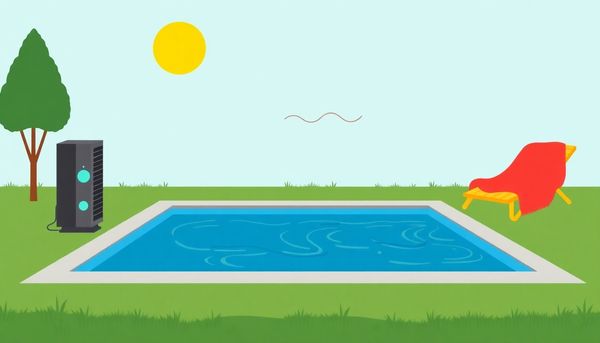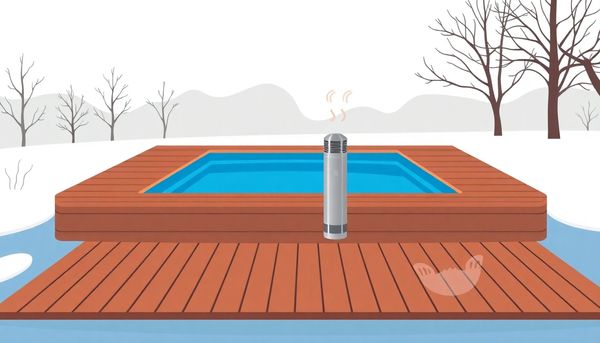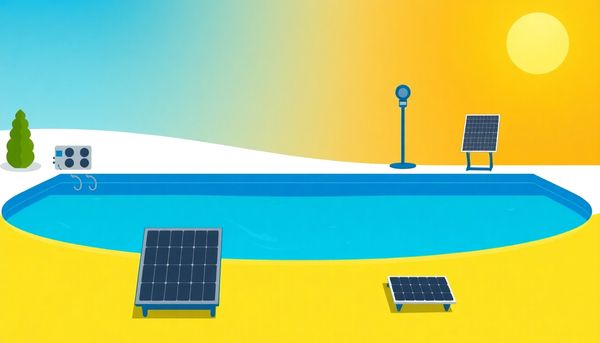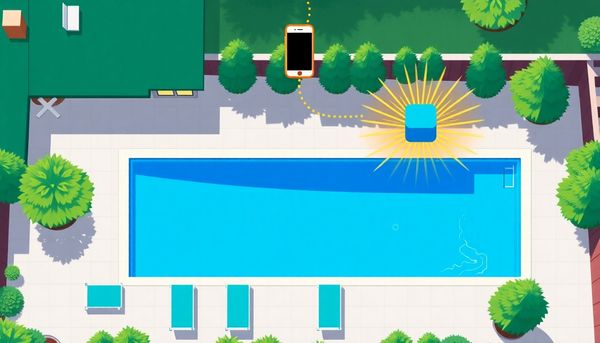Top Pool Heaters of 2025: Extend Your Swim Season with Ease
July 05th, 2024
July 05th, 2024
During those chilly mornings when the sky hints at winter, the warmth of an inground pool can transform the mundane into the luxurious. The year 2024 brings with it a range of innovative pool heaters designed not only to extend your swimming season but also to enhance your aquatic experience. Choosing the best heater is akin to finding the perfect balance between comfort and efficiency, and the options available today cater to these very needs.
Reflecting on personal experiences, nothing disrupts a planned swim more than stepping into cold water on an unexpectedly brisk day. It's a reminder of how essential the right pool heater is. This year, technology has taken significant strides. Modern heaters boast eco-friendly features, integrating seamlessly with smart home systems. Many models even allow you to adjust settings remotely, ensuring your pool's temperature is just right when you arrive home.
In the past, selecting a pool heater might have seemed daunting due to technical jargon and complex specifications. Thankfully, manufacturers now emphasize user-friendly designs and intuitive controls, making the decision-making process more accessible. From energy-efficient electric models to robust gas-powered systems, the choices are tailored to fit diverse needs and preferences.
With your pool as the centerpiece of outdoor enjoyment, investing in a high-quality heater becomes not just a choice, but a necessity. Let’s explore what makes each option stand out in 2024, and how they promise to keep your pool inviting year-round.

Swimming pools come alive when paired with the right kind of heater, especially one that's energy-efficient. Choosing an energy-efficient pool heater not only lowers your utility bills but also aligns with eco-friendly practices. It’s like hitting two birds with one stone: enjoying a warm swim while being kind to the planet. If you’ve ever experienced the sticker shock of utility bills after a few swims, you’ll understand the importance of making a wise heating choice.
A heat pump tops the list for those seeking efficiency. These heaters capture ambient air and convert it into heat, which then warms your pool. The Hayward HeatPro Heat Pump, for instance, shines in this category, using minimal energy while delivering consistent warmth. It’s ideal for moderate climates, though you might want to consider a backup for colder days.
In sun-drenched areas, solar heaters are unbeatable. They harness the sun’s power, requiring no ongoing energy costs. SmartPool S601 solar systems, for instance, utilize solar panels to boost pool temperatures gradually. The upfront cost is significantly lower than traditional systems, making them a smart investment over time.
Gas heaters, while powerful, often come with a heftier price tag in terms of energy consumption. However, they can be an excellent option when speed is of the essence, as they heat water much faster than their counterparts.
Ultimately, the choice boils down to your specific needs: the climate, budget, and how frequently you plan to use the pool. An energy-efficient pool heater ensures not only a pleasant swim season but also peace of mind knowing you’re contributing to a greener future.
Navigating the world of pool heaters can feel like wading through a sea of options, each with its own pros and cons. Understanding your specific needs is key to making an informed decision. If your pool isn’t too large, and you're keeping an eye on your budget, the Pentair MasterTemp 125 might be your ideal companion. Its compact size and affordability make it a strong contender for smaller pools, offering reliable performance without breaking the bank.
For those enduring chillier climates, a gas pool heater, like the Hayward Universal H-Series, stands out as a robust choice. These heaters are champions in swiftly raising water temperatures, making them perfect for those who can’t wait to dive in. However, they do come with higher operational costs, so budget accordingly for the long-term expenses.
Conversely, if you bask in sunny locales, a solar heater might be your eco-friendly dream. Patience is a virtue here, as these systems take their time to heat the water, but they promise significant savings on your energy bill. Just ensure you have ample space for solar panels, as their effectiveness hinges on capturing the sun’s bounty.
In essence, the right pool heater hinges on striking a balance between your climatic conditions, pool size, and patience level for toasty waters. Choose wisely, and soon you'll be relishing those perfect swimming moments, regardless of the season.
Navigating the installation of an inground pool heater is crucial for maximizing efficiency. When my neighbor decided to upgrade his heating system, he discovered that a well-thought-out installation plan saved both time and money in the long run. It’s not just about selecting the right unit; the placement and setup can have a significant impact on performance and energy consumption.
First, consider the proximity of the heater to your pool’s water pump and filtration system. This minimizes energy loss as water travels through pipes, ensuring quicker heating. My neighbor learned this the hard way when he initially installed his heater too far away, leading to longer heat-up times and higher utility bills. Locating the heater close to these systems also simplifies connections, potentially lowering installation costs.
Another factor is the local climate and environment. In windy areas, placing the heater in a sheltered spot can prevent heat loss caused by drafts, enhancing efficiency. For solar systems, positioning the panels to maximize sun exposure is essential. My friend found that angling the panels correctly and ensuring no shadows from trees or structures made a noticeable difference in water temperature.
Lastly, professional installation is worth considering, especially for gas heaters. Incorrect setups can lead to safety hazards and inefficiency. A certified installer will ensure all connections are secure, and the unit operates at peak performance. By optimizing installation, pool owners can enjoy a warm swim without facing exorbitant energy costs, ultimately extending their pool season and enjoyment.
In the pursuit of that perfect swimming experience, a pool heater plays a crucial role. Yet, owning one is just the first step; maximizing its performance can turn a pleasant dip into a luxurious swim, even when the chill sets in. Understanding your heater's capabilities is key. For instance, if you’re using a gas heater, consider running it during off-peak hours to save on utility costs while enjoying its rapid heating benefits. This can make a significant difference in colder climates where quick temperature boosts are necessary.
Maintenance is another cornerstone of peak performance. Regularly check for debris around your heater to ensure unobstructed airflow, especially important for heat pumps that rely on ambient air. Scheduling an annual professional inspection can also preemptively catch issues that could hinder efficiency. In my own backyard, a simple brush-off of the solar panels after a windy day made a remarkable difference in heat retention.
Beyond maintenance, consider leveraging complementary tools. A solar cover, for example, can trap heat overnight, reducing the workload on your heater the next day. During an impromptu poolside chat with a neighbor, they shared how implementing this small change halved their heating time. By embracing a holistic approach to heater care and usage, you can enhance both performance and longevity, ensuring your pool is always ready for that spontaneous splash.
Selecting the perfect heater for your inground pool involves more than just picking the first option you see online. Consider it akin to choosing the right gear for a long camping trip—necessity and efficiency are key, but comfort and ease of use can’t be overlooked. With various types of heaters available, each has its own strengths tailored to specific needs.
If your pool resides under a canopy of clouds in a colder climate, a gas heater might be your best ally. Gas heaters, like the Hayward Universal H-Series, are the sprinters of the pool heating world, rapidly bringing the water to a pleasant warmth. Remember, though, speed comes with a price—gas heaters tend to have higher operational costs.
On the other hand, if sunshine is a regular guest in your backyard, a solar pool heater, such as the SmartPool S601, could be an energy-efficient solution. While these heaters require a bit of patience as they soak up the sun's rays, their long-term savings can't be beat. This option works best where sunny days are plentiful.
For a well-rounded compromise, consider a heat pump like the Hayward HeatPro. These units harness ambient air to warm your pool, offering a blend of efficiency and cost-effectiveness, though they might struggle in harsher cold snaps.
Ultimately, your choice hinges on your local climate, budget, and personal preferences. The right heater will ensure you can enjoy your pool anytime, whether you prefer a quick dip or a lengthy swim.
Choosing the right pool heater involves more than just picking a model; it demands a keen understanding of your local climate. In regions where the chill bites harder, opting for a gas or electric heater becomes a necessity rather than a luxury. These heaters possess the muscle to warm up your pool rapidly, making them the go-to choice for brisk climates. Yet, remember that operating a gas heater can lead to higher utility bills over time, although its quick warmth is often worth every penny.
Conversely, sunnier climes open the door to solar heating solutions. Harnessing the sun’s generous rays not only reduces your carbon footprint but also your energy costs. However, patience is key, as solar heaters typically take longer to achieve the desired temperature. My neighbor, who lives in balmy California, swears by his solar setup—albeit with a touch of envy during his brother’s visits from frosty Maine, where a trusty gas heater is indispensable.
In transitional climates, where temperatures fluctuate, a heat pump offers a balanced approach. It cleverly extracts ambient warmth from the air, proving to be both efficient and effective. Ultimately, evaluating your climate ensures you select a heater that aligns with your environment, providing a splash of comfort throughout the swimming season. By tailoring your choice to local weather patterns, you not only enhance your swimming experience but also ensure energy-efficient operations all year round.
When considering the best inground pool heater for your setup, understanding installation complexity is crucial. Each heater type brings its own challenges, and knowing what you're up against can save you time and frustration. Gas heaters, for instance, often demand a professional touch due to the intricacies of gas line connections and electrical hookups. Not only is this safer, but it ensures that the installation meets local regulations, potentially sparing you costly fines or adjustments later.
In contrast, solar heaters present a different set of challenges. While they might seem simpler, these systems usually require ample space for panels, typically installed on a roof or a rack near the pool. Their DIY-friendly nature can lure you into tackling the installation yourself, but remember, precise placement is key to maximizing sunlight exposure and efficiency. Before embarking on such a project, double-check you have all necessary components, as installation kits are often sold separately.
Heat pumps, meanwhile, straddle the line, combining aspects of both gas and solar systems. They need proper clearance—around six feet overhead—and should ideally be handled by professionals to ensure optimal performance and compliance with safety standards. Yet, their compact design compared to gas heaters might ease some logistical burdens during installation.
Ultimately, the complexity of installing an inground pool heater varies widely. Assessing your skills, budget, and available time will guide you in choosing the right heater that aligns with your installation preferences and capabilities.
Choosing the right energy source for your inground pool heater can be likened to selecting the perfect recipe for a favorite dish—each ingredient, or in this case, energy type, brings its own flavor and efficiency. For many pool owners, the decision starts with the local climate. In colder regions, the immediate power of a gas heater often becomes an attractive option, offering rapid heating to extend swimming seasons into chillier months. Such a heater can swiftly elevate water temperatures, but be prepared for the associated utility costs, as gas tends to rank high in the expense department.
Alternatively, in more temperate zones, electric heat pumps shine as the heroes of efficiency. They harness ambient air to warm the water, resulting in lower continuous costs. A friend of mine in Florida swears by her heat pump, praising its ability to maintain her pool at a comfy temperature without the hefty bills. However, when temperatures dip too low, these pumps can struggle, which is a crucial detail to consider.
Solar heaters, meanwhile, embody the essence of patience and sustainability. They beckon to those basking in sun-drenched locales who don't mind a leisurely wait for warm water. While solar panels require ample space and sunlight, they reward users with significant savings over time. Each energy type offers distinct pros and cons, making it essential to align your selection with your local weather patterns, budget, and pool usage to ensure your swim season is just right.

When considering an inground pool heater, tailoring your choice to your local climate can significantly enhance your swimming experience while optimizing costs. Different climates impose varying demands on pool heating, and understanding these can lead to more informed decisions.
In colder regions, where the chill lingers long past the first signs of spring, a gas heater often emerges as the most pragmatic choice. Gas heaters like the Hayward Universal H-Series provide rapid heating, which is vital when the air temperature dips unexpectedly. Although they may lead to higher utility bills due to gas consumption, their ability to quickly warm the pool means you won’t have to wait long before diving in.
In contrast, if you reside in a temperate or sunny climate, such as Southern California or Florida, leveraging the sun's power with a solar heater could be just the ticket. Here, the SmartPool S601 harnesses solar energy, offering a sustainable and cost-efficient solution. It may take longer to achieve your desired temperature, but the absence of ongoing energy costs makes it an appealing long-term choice for sun-drenched areas.
For those in climates that swing between extremes, a heat pump like the Hayward HeatPro can offer a balanced approach. It efficiently utilizes ambient warmth and is particularly effective when outside temperatures hover around moderate levels. Although initial costs may be higher, the energy savings can quickly offset those expenses.
Ultimately, aligning your pool heater choice with your climate not only ensures comfort but also maximizes efficiency and cost-effectiveness.
Selecting the perfect heater for your inground pool can feel like navigating a maze, with each turn presenting a different option and trade-off. First, consider the ever-reliable gas heaters. They’re the powerhouse of the pool heating world, known for their ability to warm your waters quickly, regardless of size. A friend of mine swears by her gas heater, particularly in the frosty mornings of spring when she’s itching for a swim. However, they do come with higher operational costs and require a nearby gas line, which can be a deal-breaker for some.
On the other hand, electric heaters, especially heat pumps, have gained popularity for their energy efficiency. They draw warmth from the air, which makes them a great option if you're in a moderate climate. I once helped set up a heat pump for a neighbor, and it was surprising how the system harnessed ambient temperatures to maintain a cozy pool environment. However, in colder climates, their performance can dip, leaving you yearning for that extra warmth.
Solar heaters, meanwhile, are the eco-friendly champions, harnessing the sun's power to heat your pool. Ideal for sun-drenched areas, they are light on your wallet in the long run, although the initial setup can be an investment. A college buddy of mine installed solar panels, finding that, with a little patience, his pool stayed warm enough for most of the year. But remember, in less sunny climes, they might not meet your expectations.
In your quest for the perfect pool heater, think about your specific needs: climate, pool size, budget, and installation ease. Each heater type offers unique benefits, and aligning these with your circumstances will ensure you enjoy the perfect swim, every time.
In the quest for the perfect inground pool heater, climate efficiency often takes center stage. Living in a region with distinct seasons, I quickly learned that not all heaters are created equal. In areas where temperatures dip significantly, relying on a solar heater might leave you shivering. Instead, a gas heater is a powerhouse, capable of raising your pool temperature swiftly, making those chilly mornings disappear in a matter of hours. However, this efficiency comes at a cost—gas heaters tend to be less forgiving on the pocket with ongoing utility expenses.
Conversely, in sunnier locales, harnessing the sun’s energy with a solar heater can be both economical and eco-friendly. A friend in Arizona swears by her solar panels, which gradually warm her pool without a monthly bill shock. Yet, patience is crucial, as solar systems require sunny days to work their magic.
For those seeking a middle ground, heat pumps present an appealing option. These systems derive warmth from the air, offering an efficient solution that balances cost and performance. I’ve seen firsthand how a heat pump maintains a cozy swim temperature without the financial strain of constant gas consumption. When choosing your heater, consider not just the immediate climate but the long-term efficiency and cost implications. Your choice can transform your pool experience from a luxury to an everyday pleasure.
Selecting the perfect spot for your inground pool heater is crucial for maximizing efficiency and longevity. Many overlook this step, but it can significantly impact performance and maintenance costs over time. When I installed my first pool heater, I learned the hard way that location matters. A shady corner of the yard seemed convenient, but it resulted in sluggish heating due to lack of sunlight and poor ventilation.
To start, consider proximity to the pool itself. Every inch of distance increases heat loss, so minimizing this gap ensures you’re making the most of the heater’s capability. Your choice should also account for prevailing winds; placing a heater in a windy zone may reduce its efficiency, as gusts can cool exposed components. Situating the heater in a naturally sheltered area can help mitigate this.
When using solar heaters, adequate sun exposure is non-negotiable. A south-facing roof or an open area with consistent sunlight is ideal. However, solar panels shouldn’t be installed under tree canopies or in spots prone to frequent cloud cover. For gas and electric heaters, check local regulations regarding ventilation and clearances. Many models require professional installation to ensure safe gas line connections and adherence to building codes.
Finally, think about accessibility. Regular maintenance is vital, so ensure there's enough space to easily reach the heater for repairs or seasonal adjustments. A well-chosen location not only enhances your heater's performance but also simplifies caring for your pool year-round.

Ensuring your pool stays invitingly warm throughout the year involves more than just selecting the right heater; the installation process is crucial for optimal performance. A friend once shared an anecdote about rushing to install a heater, only to face recurring issues, emphasizing the importance of a thoughtful approach.
First, consider your pool's location and surrounding environment. If your pool is shielded by trees or structures, it may limit sunlight exposure, affecting a solar heater's efficiency. For gas and electric heaters, proximity to power sources or gas lines is vital to minimize installation complexities and costs. A clear path for the heater’s ventilation and access to maintenance is equally important, reducing the risk of operational hiccups.
Next, professional installation is often recommended, especially for gas heaters, which require precise handling of plumbing and gas lines. Missteps here can lead to safety hazards and inefficiencies. Electric heaters might seem more straightforward, yet their connection to your home’s electrical system demands a certified electrician to avoid potential mishaps.
Lastly, don’t overlook regular maintenance. Scheduling annual checks ensures your heater remains efficient and extends its lifespan. Much like how a car needs regular servicing, your pool heater’s upkeep can save you from unexpected breakdowns and costly repairs. Adopting this comprehensive approach not only allows for a seamlessly warm pool but also peace of mind throughout the swim season.
Choosing the right heater for your inground pool is akin to picking the perfect playlist for a summer barbecue—each option sets a different mood and offers a unique experience. Imagine living in a region where mornings are cool but afternoons blaze under the sun. For this scenario, a heat pump might be your best friend, efficiently drawing warmth from the air to keep your pool inviting without skyrocketing your utility bills. However, if your climate leans towards the chilly side, a gas heater may suit you better. It can transform icy waters into a warm oasis in just a few hours, making it ideal for an impromptu swim, albeit at a steeper running cost.
Venturing into sunnier territories, solar heaters bask in their element. They thrive on ample sunlight to gradually raise your pool's temperature, offering an eco-friendly solution that's kind to your wallet in the long run. Yet, they demand patience and plenty of sunlit space for installation.
Consider not just the immediate comfort but your long-term relationship with the device. Your pool's size and your personal preference for installation complexity are just as crucial. Each heater type comes with its own set of requirements, from adequate space for solar panels to the professional installation often needed for gas models. It's about finding harmony between your lifestyle and poolside dreams.
In the quest for the ideal inground pool heater, climate considerations play a pivotal role. Imagine the chill of a morning swim in Wisconsin compared to the perpetual warmth of a Florida afternoon; each scenario demands a tailored approach to pool heating. Those residing in northern, cooler climates might find solace in the rapid heating capabilities of gas heaters. With their robust power, they can quickly elevate water temperatures, making them indispensable during short summer windows or for year-round swimmers who brave colder seasons. However, this warmth comes at a cost, as gas heaters are known for higher operational expenses.
In contrast, sun-drenched regions offer an opportunity to harness solar energy, transforming sunlight into sustainable pool warmth. The solar option, while slower, complements areas with consistent sunny weather. It’s a budget-friendly solution for those who can afford to wait a few days for the perfect swim temperature. But what about those in temperate zones, where the weather dances between extremes? A heat pump might serve as the perfect middle ground, efficiently using ambient air to heat the pool without breaking the bank on utility bills.
Ultimately, understanding your climate is key to making an informed decision. By aligning your heater choice with local weather patterns and your heating preferences, you'll enhance both your swimming experience and energy efficiency.
Tackling the installation of an inground pool heater can feel like unraveling a mystery, especially if you're not particularly handy. Each type of heater—be it gas, electric, or solar—presents its own unique set of challenges. For instance, gas heaters often require a professional touch. Their installation typically involves intricate connections to both gas and electrical lines, and mishandling these could lead to more than just a spike in your utility bill. I once attempted to install a gas heater with a friend, and let's just say we quickly realized it was a job better left to the experts.
Electric heat pumps, while more straightforward, also come with their own quirks. They require a significant amount of clearance space, at least six feet above the unit, for proper ventilation. Not to mention, the electrical connections need precision—something an experienced electrician should handle to prevent any risk of mishaps. On the other hand, solar heaters invite the DIY enthusiast with open arms. Yet, they demand ample space, preferably on a sun-drenched roof, which might not be feasible for everyone.
Space considerations are crucial across the board. You'll need a strategic plan for solar panels or ensure that gas units are correctly housed for safety and efficiency. These challenges aren't just hurdles; they're also reminders of the importance of getting it right the first time. After all, the joy of a warm pool is worth the effort of thorough planning and professional assistance where needed.

In the world of inground pool heating, finding cost-effective solutions is like uncovering hidden treasures in your backyard. The key is understanding the interplay between upfront costs and long-term savings. Choosing the right heater can make a significant difference, not just in how quickly your pool reaches the desired temperature, but also in how much you save on energy bills over time.
Consider heat pumps for instance. These devices harness ambient air, making them incredibly energy-efficient. A friend of mine installed a Hayward HeatPro Heat Pump last year, and despite the initial investment, she noted a marked drop in her monthly energy expenses. Heat pumps are particularly advantageous for those in milder climates, where the air remains relatively warm year-round.
On the other hand, solar pool heaters, such as the SmartPool S601, offer a budget-friendly and sustainable solution for sun-drenched regions. While they require patience due to slower heating times, their energy input comes from the sun, which effectively means zero ongoing costs. My neighbor swears by his solar setup, boasting about the minimal maintenance and the enjoyment of an extended swim season without a spike in utility bills.
Lastly, always weigh the initial installation and potential professional fees against the heater's performance and longevity. Spending more upfront can often lead to higher savings down the line, proving that a little planning can lead to a warmer, more financially savvy swim season.
When considering an inground pool heater for 2024, energy efficiency should be a pivotal part of your decision-making process. Opting for an energy-efficient model not only benefits the environment but also significantly reduces your long-term operating costs. Among the popular choices, heat pumps stand out as an effective energy-saving option. They cleverly harness ambient air to heat your pool, making them particularly suitable for regions with moderate climates. The Hayward HeatPro Heat Pump, for instance, offers a blend of efficiency and power, perfect for those wanting to keep utility bills in check while enjoying a warm swim.
For sun-drenched locales, solar heaters provide an eco-friendly and cost-effective alternative. The SmartPool S601 Pool Solar Heater capitalizes on solar energy, though it requires patience as it takes time to heat the pool. However, it doesn’t add to your electricity or gas bills, which is a major plus.
On the other hand, if you’re leaning toward a traditional approach but still want to keep an eye on energy usage, consider advanced models like the Pentair MasterTemp 125. This compact gas heater is designed with modern eco-conscious features, such as low NOx emissions, offering a balance between performance and environmental responsibility.
Choosing the right energy-efficient pool heater ensures not only comfort and convenience but also serves as a wise investment for years to come.

So, you're standing at the edge of your pool, contemplating the crispness of the water, when it dawns on you that extending your swim season isn't just a luxury—it's a possibility. With the right inground pool heater, those chilly mornings and cool evenings can transform into opportunities for relaxation and enjoyment. Instead of waiting for the sun to do its job, a reliable heater gives you control over your swimming environment, making it an investment in comfort.
Choosing the perfect heater involves more than just picking the first one that catches your eye. It's about understanding what fits your lifestyle and pool specifications. Perhaps, like my friend who lives in the Midwest, you find the Hayward Universal H-Series Gas Heater a lifesaver during unpredictable spring weather. It quickly warms the pool, ready to host an impromptu family gathering. Alternatively, if you bask in the sunny stretches of the South, the SmartPool S601 Solar Heater might be your go-to, offering an eco-friendly approach with the patience of a sun lover.
For those who cherish reliability, the Pentair MasterTemp 125 is hard to beat, especially in smaller spaces. By considering factors like pool size, climate, and energy preferences, you tailor your choice, ensuring every swim is as warm and welcoming as you envision. Whether for an early morning dip or a late-night splash, enhancing your swim season starts with the right heater, turning your pool into a personalized paradise.

This article provided insights into maintaining your pool. Start your pool care journey today!
Want to become a pool maintenance expert? Our free Pool School course covers everything you need to know about pool care. From basic maintenance to advanced troubleshooting, you'll learn how to:
Join over 10,000 pool owners who have already transformed their pool care routine. Get started with our free Pool School course today!